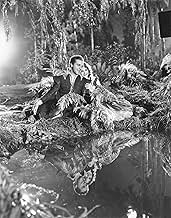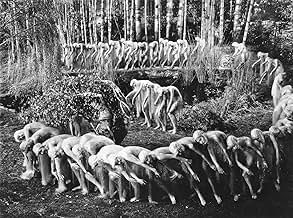ÉVALUATION IMDb
6,8/10
4 k
MA NOTE
Deux couples et une troupe d'acteurs ont une rencontre avec des fées espiègles dans la forêt.Deux couples et une troupe d'acteurs ont une rencontre avec des fées espiègles dans la forêt.Deux couples et une troupe d'acteurs ont une rencontre avec des fées espiègles dans la forêt.
- A remporté 2 oscars
- 2 victoires et 2 nominations au total
Olivia de Havilland
- Hermia - In Love with Lysander
- (as Olivia de Haviland)
Nini Theilade
- Fairie - Attending Titania
- (as Nina Theilade)
Histoire
Le saviez-vous
- AnecdotesWhen the forest that Max Reinhardt designed could not be lit properly, cinematographer Hal Mohr thinned the trees slightly, sprayed them with aluminum paint and covered them with cobwebs and tiny metal particles to reflect the light. As a result, he became the first (and only) write-in winner of an Academy Award.
- GaffesCorrective lenses were introduced in the 13th century so they could have been worn in Shakespeare's time.
- Citations
Hermia, in Love with Lysander: [to Helena] How low am I, you painted maypole? Speak! How low am I? I am not yet so low but that my nails can reach into your eyes!
- Générique farfeluThe opening credits appear as if they were "trickling down" from the top of the screen.
- Autres versionsThe original 132-minute roadshow version of this film has been restored, shown on cable, and issued on videocassette and DVD. For many years, though, this film was shown only in its general release version, a 117-minute version painstakingly edited by the studio (so that the cuts would not be noticeable), which shifted the order of some sequences and eliminated others.The 2007 DVD release also restores the Intermission title card, not seen since the film's original roadshow release in 1935, as well as including the overture and exit music.
- ConnexionsFeatured in A Dream Comes True (1935)
- Bandes originalesA Midsummer Night's Dream: Overture and Incidental Music
(1826) (uncredited)
Music by Felix Mendelssohn
Adapted by Erich Wolfgang Korngold
Heard throughout the film
Commentaire en vedette
A Midsummer Night's Dream was to be Jack Warner's bow to culture back during the Depression. The economical studio which specialized in urban dramas was doing something that normally MGM would have taken the lead in. In fact I'm not so sure that Louis B. Mayer decided that if Warner Brothers could make Shakespeare popular, he could do it better and hence Norma Shearer got to star in Romeo and Juliet.
The great German Impresario producer Max Reinhardt with co-direction from another German emigrant, William Dieterle, put this together. He played to Warner Brothers other strength, those Busby Berkeley musicals and their intricate numbers. Visually, A Midsummer Night's Dream is stunning with an ethereal quality as the various faeries and nymphs go through the woods. They do their thing to Mendelsohn's great music as arranged by Erich Wolfgang Korngold. In fact this was the start of Korngold's relationship with the brothers Warner and some of the great musical scores he wrote for them.
This was also the start of Olivia DeHavilland's great career. Olivia is one of the few major stars who literally went from unknown to star in one fell swoop. She had graduated high school and was doing some summer stock before entering college when Max Reinhardt spotted here while touring America with A Midsummer Night's Dream. When Warner Brothers got his services for this film, he brought with him Olivia and personally cast her as Hermia.
The film was held up with editing, scoring, retakes, and Olivia made and was seen in two low budget films before A Midsummer Night's Dream was released. So her debut is in a Joe E. Brown film, Alibi Ike. But this is her first film.
The material was familiar to Olivia, but not all her fellow players at Warner Brothers were so blessed. Dick Powell said that this film was one of the two worst experiences he had while at that studio. He had no training of any kind to do this classical piece and said he was lost through out the whole production.
James Cagney is no classical actor either, but as Bottom with or without the donkey's head on him, courtesy of Puck, Cagney brings his boisterous style to the proceedings and it works for the most part. Some of the other tradespeople in the town Frank McHugh, Dewey Robinson and Joe E. Brown look pretty lost though.
On loan out from MGM, Mickey Rooney steals the show as Puck. On orders from Victor Jory the Faerie King to play a little joke on his wife Anita Louise, Rooney casts a spell on her that will make her fall for the first living soul she sees. Rooney decides on is own to sweeten the joke by giving James Cagney a donkey's head and making sure that Louise sees him first. And of course the four lovers, Dick Powell, Ross Alexander, Jean Muir, and Olivia DeHavilland, Rooney confuses their affections as well as a bonus.
Rooney who was another kid actor up to this point, got his first real critical notices in this. It led to his becoming a major star over at MGM and Louis B. Mayer never lending him out to anyone again as long as he was under contract there.
A Midsummer Night's Dream is a curious film. Shakespearean purists might recoil at some of the casting, but I'm sure it was entertaining enough for the Depression audiences.
The great German Impresario producer Max Reinhardt with co-direction from another German emigrant, William Dieterle, put this together. He played to Warner Brothers other strength, those Busby Berkeley musicals and their intricate numbers. Visually, A Midsummer Night's Dream is stunning with an ethereal quality as the various faeries and nymphs go through the woods. They do their thing to Mendelsohn's great music as arranged by Erich Wolfgang Korngold. In fact this was the start of Korngold's relationship with the brothers Warner and some of the great musical scores he wrote for them.
This was also the start of Olivia DeHavilland's great career. Olivia is one of the few major stars who literally went from unknown to star in one fell swoop. She had graduated high school and was doing some summer stock before entering college when Max Reinhardt spotted here while touring America with A Midsummer Night's Dream. When Warner Brothers got his services for this film, he brought with him Olivia and personally cast her as Hermia.
The film was held up with editing, scoring, retakes, and Olivia made and was seen in two low budget films before A Midsummer Night's Dream was released. So her debut is in a Joe E. Brown film, Alibi Ike. But this is her first film.
The material was familiar to Olivia, but not all her fellow players at Warner Brothers were so blessed. Dick Powell said that this film was one of the two worst experiences he had while at that studio. He had no training of any kind to do this classical piece and said he was lost through out the whole production.
James Cagney is no classical actor either, but as Bottom with or without the donkey's head on him, courtesy of Puck, Cagney brings his boisterous style to the proceedings and it works for the most part. Some of the other tradespeople in the town Frank McHugh, Dewey Robinson and Joe E. Brown look pretty lost though.
On loan out from MGM, Mickey Rooney steals the show as Puck. On orders from Victor Jory the Faerie King to play a little joke on his wife Anita Louise, Rooney casts a spell on her that will make her fall for the first living soul she sees. Rooney decides on is own to sweeten the joke by giving James Cagney a donkey's head and making sure that Louise sees him first. And of course the four lovers, Dick Powell, Ross Alexander, Jean Muir, and Olivia DeHavilland, Rooney confuses their affections as well as a bonus.
Rooney who was another kid actor up to this point, got his first real critical notices in this. It led to his becoming a major star over at MGM and Louis B. Mayer never lending him out to anyone again as long as he was under contract there.
A Midsummer Night's Dream is a curious film. Shakespearean purists might recoil at some of the casting, but I'm sure it was entertaining enough for the Depression audiences.
- bkoganbing
- 16 déc. 2005
- Lien permanent
Meilleurs choix
Connectez-vous pour évaluer et surveiller les recommandations personnalisées
- How long is A Midsummer Night's Dream?Propulsé par Alexa
Détails
- Date de sortie
- Pays d’origine
- Site officiel
- Langue
- Aussi connu sous le nom de
- A Midsummer Night's Dream
- Lieux de tournage
- sociétés de production
- Consultez plus de crédits d'entreprise sur IMDbPro
Box-office
- Brut – à l'échelle mondiale
- 2 616 000 $ US
- Durée2 heures 13 minutes
- Couleur
- Mixage
- Rapport de forme
- 1.37 : 1
Contribuer à cette page
Suggérer une modification ou ajouter du contenu manquant

Lacune principale
By what name was Le Songe d'une nuit d'été (1935) officially released in India in English?
Répondre


























